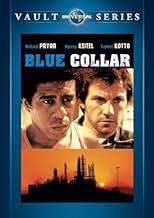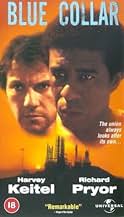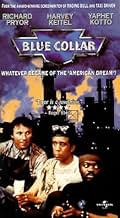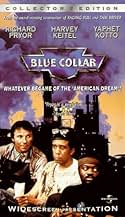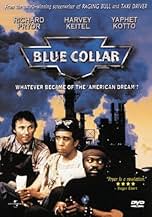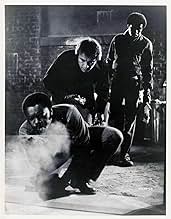IMDb रेटिंग
7.5/10
12 हज़ार
आपकी रेटिंग
जब तीन श्रमिक स्थानीय संघ से चोरी करने की कोशिश करते हैं, तो वे इसके बजाय भ्रष्टाचार का पता लगाते हैं।जब तीन श्रमिक स्थानीय संघ से चोरी करने की कोशिश करते हैं, तो वे इसके बजाय भ्रष्टाचार का पता लगाते हैं।जब तीन श्रमिक स्थानीय संघ से चोरी करने की कोशिश करते हैं, तो वे इसके बजाय भ्रष्टाचार का पता लगाते हैं।
- निर्देशक
- लेखक
- स्टार
- पुरस्कार
- 1 जीत और कुल 2 नामांकन
फ़ीचर्ड समीक्षाएं
Three workers in a car plant take it onto themselves to rob the safe of their Union office. They come away with only $600 but they find themselves with information that they can use to blackmail the union. However the union plans to kill the men and turn them against each other.
From the writer of Taxi Driver comes this tough little social piece about how the working man is screwed by the `system'. The plot follows three men trying to make out (admittedly illegally) and the way the system uses them against each other etc to shut them up. The plot is very clever and the writing is superb.
Pryor is great he could have been his comedy self but his acting is really sublime. Likewise Keitel and Kotto are on top form and the support from Begley et al is really good. The film will engross you and the final shot and line will stay with you for years.
Overall an underrated classic that deserves as many viewers as possible.
From the writer of Taxi Driver comes this tough little social piece about how the working man is screwed by the `system'. The plot follows three men trying to make out (admittedly illegally) and the way the system uses them against each other etc to shut them up. The plot is very clever and the writing is superb.
Pryor is great he could have been his comedy self but his acting is really sublime. Likewise Keitel and Kotto are on top form and the support from Begley et al is really good. The film will engross you and the final shot and line will stay with you for years.
Overall an underrated classic that deserves as many viewers as possible.
I had to admit something to myself after watching Blue Collar; that I have preconceptions about any movie starring Richard Pryor. Pryor made so many silly comedies like "Stir Crazy" and "Moving" I tend to want to dismiss or label every movie in which he appeared...bad move. Blue Collar is a highly entertaining film that works on several levels. Most of all it scores as a raw, gritty, muckraking type of film exposing the corruption of labor unions and corporate America. Secondly, it works pretty well on a comedic level, but its funny because it's real. The acting here is top notch and Pryor really stands out, and as good as Harvey Keitel is as an actor, Pryor matches him step for step.
Zeke, Jerry and Smokey (Pryor, Keitel and Yaphet Kotto) are three buddies working for the Auto union at Checker Automotive. (a real car maker that allowed the movie to be filmed at their plant, after the big three rejected it) By day, they weld, paint and rivet, by night, they drink and party and concoct schemes to get ahead financially. Eventually they stumble upon a ledger that contains proof that their union is corrupt. They decide to blackmail the union bosses and things start to get complicated. At this point, the film starts to take a more serious tone as the union fights back in a way nobody expected. Zeke is the only one of the three the union bosses are very concerned about and soon he is being offered a promotion.
Pryors even-keeled performance is the key to the film. He's tough and unflappable but smart enough to know when to give in to the powers that determine his fate. His decisions aren't necessary the ones you expect out of a Hollywood movie, but they are the ones that would likely be made in real life....and thats part of the tragedy.
Another great aspect of Blue Collar is the bluesy soundtrack by Jack Nitzsche, with guitar work by the legendary Ry Cooder and the title track performed by Captain Beefheart. The establishing scenes over the opening credits are highlighted by the blues soundtrack with actual punch press sounds incorporated into the music. Its really unique... and a special nod needs given to director Paul Shrader, who handles the films change in tone nicely, and gives the film a tightness and realism that keeps our attention focused throughout.
The movie Blue Collar, viewed today, is like a living time capsule from the 1970s. Lynyrd Skynyrd on the Jukebox, "Good Times" on the TV and Strohs Beer being served at the local Bar. Blue Collar will have a special significance for those who (like me) are from the Midwest...the rust belt. This all seems so familiar, the mindset of these union workers, the us against them mentality...feeling defeated by the system...too far in debt to go a different route in life.
Some of the characters here remind me of the fathers of some of the kids I grew up with. It left me contemplating the question -were we better off when the auto unions were stronger or not? 'real wages' haven't gone up in nearly 40 years. We lose more jobs overseas every year. Were the times depicted in Blue Collar actually the "good old days"?...or more like, the last of the good old days?
When Smokey makes his cryptic speech about "the old being pitted against young, black being pitted against white, everything they do is to keep us in our place"...He isn't just talking about the labor unions, I think he is talking about the whole system itself. Scary thought.
Zeke, Jerry and Smokey (Pryor, Keitel and Yaphet Kotto) are three buddies working for the Auto union at Checker Automotive. (a real car maker that allowed the movie to be filmed at their plant, after the big three rejected it) By day, they weld, paint and rivet, by night, they drink and party and concoct schemes to get ahead financially. Eventually they stumble upon a ledger that contains proof that their union is corrupt. They decide to blackmail the union bosses and things start to get complicated. At this point, the film starts to take a more serious tone as the union fights back in a way nobody expected. Zeke is the only one of the three the union bosses are very concerned about and soon he is being offered a promotion.
Pryors even-keeled performance is the key to the film. He's tough and unflappable but smart enough to know when to give in to the powers that determine his fate. His decisions aren't necessary the ones you expect out of a Hollywood movie, but they are the ones that would likely be made in real life....and thats part of the tragedy.
Another great aspect of Blue Collar is the bluesy soundtrack by Jack Nitzsche, with guitar work by the legendary Ry Cooder and the title track performed by Captain Beefheart. The establishing scenes over the opening credits are highlighted by the blues soundtrack with actual punch press sounds incorporated into the music. Its really unique... and a special nod needs given to director Paul Shrader, who handles the films change in tone nicely, and gives the film a tightness and realism that keeps our attention focused throughout.
The movie Blue Collar, viewed today, is like a living time capsule from the 1970s. Lynyrd Skynyrd on the Jukebox, "Good Times" on the TV and Strohs Beer being served at the local Bar. Blue Collar will have a special significance for those who (like me) are from the Midwest...the rust belt. This all seems so familiar, the mindset of these union workers, the us against them mentality...feeling defeated by the system...too far in debt to go a different route in life.
Some of the characters here remind me of the fathers of some of the kids I grew up with. It left me contemplating the question -were we better off when the auto unions were stronger or not? 'real wages' haven't gone up in nearly 40 years. We lose more jobs overseas every year. Were the times depicted in Blue Collar actually the "good old days"?...or more like, the last of the good old days?
When Smokey makes his cryptic speech about "the old being pitted against young, black being pitted against white, everything they do is to keep us in our place"...He isn't just talking about the labor unions, I think he is talking about the whole system itself. Scary thought.
Paul Schrader's Blue Collar paints a depressing picture of the American blue collar worker - one Karl Marx would've simply shook his head at and scoff at in disgust. It shows a group of relatable individuals, all of whom slumming their lives away at a dead end, blue collar job, knowing all too well that they're expendable employees, when one particular member of the labor union is so unsatisfied with the lack of productivity on part of his union bosses that he challenges the incumbent to run for union boss. He believes that, if elected, he'd work for the people rather than having the people voice demands that ostensibly appear to fall on deaf ears. It isn't until he inches closer and closer to this potential gig that he realizes just what he's up against, the hoops he'll have to jump through, and the soul of his he'll have to sell in order as a price that comes with that kind of title.
The optimistic soul is Zeke Brown (Richard Pryor), who works alongside his two best friends Jerry Bartowski (Harvey Keitel) and Smokey James (Yaphet Kotto). A great deal of Zeke's motivation to run for union boss comes when a tax collector comes to his house to collect unpaid taxes. In a bout of rage and frustration I'm sure many of us have felt, Zeke rants at the blameless tax collector by saying he barely makes enough money to buy food for his home, let alone keep the electricity running. He follows up by asking why he can't get a break when the same tax collectors give countless breaks to those on Wall Street. Zeke's rant is one of the defining scenes of this film, for it tackles a problem that, even over thirty years following this film's release, is a constant, every-day problem and insurmountable battle for a great deal of families.
Zeke, Jerry, and Smokey decide to find a way to rob the union headquarters. However, upon executing their plan, they discover the union boss doesn't lie when he says that the union is low on cash, for they find very little money. The trio then stumble upon a ledger that contains information about illegal loans that reveal mob connections. Now the men know what it's like to be plunged into a world of crime and uncertainty, with their lives at risk and their optimism for their careers turned into a bitter, backstabbing game of survival of the fittest in a capitalist nightmare.
There's a sadness that lurks in many American crime dramas and that sadness usually stems from the fact that something that should benefit people, or, at the very least, give them something to believe in, doesn't actually operate the way people think it does. Martin Scorsese's Casino showed us the brutal interworkings of a Las Vegas casino that was rigged to make the consumer lose at all cost, and make the soul pay a hefty price had they tried to beat the odds, and a movie like Oldboy shows the real ugliness of people in a crowded, tight-knit area that would lead you to believe people would be brought together or at least unified on a collective term. Blue Collar, however, cuts deeper. These are blue collar jobs we're looking at with this film; not clean-cut white collar jobs and not a rare case of fraud or backhanded dealings in one company. These kinds of manipulating tactics used amongst big business are an unfortunately common practice and Schrader exposes it in a startling manner.
Schrader uses his exposure by getting Richard Pryor the leading role in a film that only manages to be funny when Pryor's character shows off his brazen attitude, which is very infrequent. Here, Pryor goes from the easily recognizable funny-man many of us know him as to a frighteningly hungry character, be it hungry for truth, or eventually, hungry for manipulation and winning. He commands the screen, even when assisted by the likes of Kotto and Keitel. This is his film through and through, a film where his formerly basic color palette of an actors transcends any kind of pre-conceived notions or judgment and shine bright and really show audiences his capabilities as a well-rounded character actor.
Blue Collar is an ugly film, thematically and in terms of the situations its characters are forced into. It shows personal economic freedom and progress as a neverending cycle that results in nothing but further inequality and disenfranchisement from a country that allegedly fights against it. If a film like this came out in present time it would be a strong social statement, but its 1978 release date shows that little has changed in present time when it comes to the dealings of big business.
Starring: Richard Pryor, Harvey Keitel, and Yaphet Kotto. Directed by: Paul Schrader.
The optimistic soul is Zeke Brown (Richard Pryor), who works alongside his two best friends Jerry Bartowski (Harvey Keitel) and Smokey James (Yaphet Kotto). A great deal of Zeke's motivation to run for union boss comes when a tax collector comes to his house to collect unpaid taxes. In a bout of rage and frustration I'm sure many of us have felt, Zeke rants at the blameless tax collector by saying he barely makes enough money to buy food for his home, let alone keep the electricity running. He follows up by asking why he can't get a break when the same tax collectors give countless breaks to those on Wall Street. Zeke's rant is one of the defining scenes of this film, for it tackles a problem that, even over thirty years following this film's release, is a constant, every-day problem and insurmountable battle for a great deal of families.
Zeke, Jerry, and Smokey decide to find a way to rob the union headquarters. However, upon executing their plan, they discover the union boss doesn't lie when he says that the union is low on cash, for they find very little money. The trio then stumble upon a ledger that contains information about illegal loans that reveal mob connections. Now the men know what it's like to be plunged into a world of crime and uncertainty, with their lives at risk and their optimism for their careers turned into a bitter, backstabbing game of survival of the fittest in a capitalist nightmare.
There's a sadness that lurks in many American crime dramas and that sadness usually stems from the fact that something that should benefit people, or, at the very least, give them something to believe in, doesn't actually operate the way people think it does. Martin Scorsese's Casino showed us the brutal interworkings of a Las Vegas casino that was rigged to make the consumer lose at all cost, and make the soul pay a hefty price had they tried to beat the odds, and a movie like Oldboy shows the real ugliness of people in a crowded, tight-knit area that would lead you to believe people would be brought together or at least unified on a collective term. Blue Collar, however, cuts deeper. These are blue collar jobs we're looking at with this film; not clean-cut white collar jobs and not a rare case of fraud or backhanded dealings in one company. These kinds of manipulating tactics used amongst big business are an unfortunately common practice and Schrader exposes it in a startling manner.
Schrader uses his exposure by getting Richard Pryor the leading role in a film that only manages to be funny when Pryor's character shows off his brazen attitude, which is very infrequent. Here, Pryor goes from the easily recognizable funny-man many of us know him as to a frighteningly hungry character, be it hungry for truth, or eventually, hungry for manipulation and winning. He commands the screen, even when assisted by the likes of Kotto and Keitel. This is his film through and through, a film where his formerly basic color palette of an actors transcends any kind of pre-conceived notions or judgment and shine bright and really show audiences his capabilities as a well-rounded character actor.
Blue Collar is an ugly film, thematically and in terms of the situations its characters are forced into. It shows personal economic freedom and progress as a neverending cycle that results in nothing but further inequality and disenfranchisement from a country that allegedly fights against it. If a film like this came out in present time it would be a strong social statement, but its 1978 release date shows that little has changed in present time when it comes to the dealings of big business.
Starring: Richard Pryor, Harvey Keitel, and Yaphet Kotto. Directed by: Paul Schrader.
This 1978 Universal release is one of raunchy comedian Richard Pryor's best films and it's a highly serious drama. Pryor successfully goes for a major change of pace in this tale of a trio of auto assembly workers (Pryor, Harvey Keitel, Yaphet Kotto) who are all having some major home, work and family problems and how they decide to solve them by developing a scheme to rob the union for which they work. When they put their plan to work, things eventually go from bad to worse. It may sound like a crime comedy caper with Pryor portraying his usual con man role but it's far more serious than that and Pryor proves that he doesn't have to get laughs in order to deliver a good film performance.
7tavm
Richard Pryor, Harvey Keitel, and Yaphet Kotto give compelling performances in the drama Blue Collar
After years of reading about this Paul Schrader drama, I finally watched Blue Collar on Netflix Streaming. It stars Richard Pryor, Harvey Keitel, and Yaphet Kotto as three auto assembly workers who feel let down by their bosses and the union rep they don't trust. While Pryor does have some comic moments, he's allowed to be more serious when the film takes a route that challenges these three friends' loyalty to each other. Keitel and Kotto are also very compelling especially when the story concerns the latter's fate. And the score by Jack Nitzsche and Ry Cooder really pours the blues on. So on that note, I recommend Blue Collar. By the way, having noticed that the movie is produced by Norman Lear's company of T.A.T. Communications, he certainly wasn't above plugging his shows "The Jeffersons" and "Good Times" by putting some long clips in when the characters are watching television!
क्या आपको पता है
- ट्रिवियाIt was a very tense shoot, because Richard Pryor, Yaphet Kotto, and Harvey Keitel argued constantly. There were fights, verbal abuse, walk-offs, and Mexican stand-offs. According to Paul Schrader, Pryor punched Keitel and hit Kotto with a chair during filming.
- गूफ़Whenever the actors use air powered tools, the tools just spin in mid-air.
- भाव
[last lines]
Smokey James: [voiceover echoing earlier line] They pit the lifers against the new boy and the young against the old. The black against the white. Everything they do is to keep us in our place.
- कनेक्शनFeatured in At the Movies: Special Show: At the Cassette Store, Part 3 (1986)
- साउंडट्रैकHard Workin Man
Music by Jack Nitzsche
Lyrics by Jack Nitzsche, Ry Cooder and Paul Schrader
Performed by Don Van Vliet (as Captain Beefheart)
टॉप पसंद
रेटिंग देने के लिए साइन-इन करें और वैयक्तिकृत सुझावों के लिए वॉचलिस्ट करें
- How long is Blue Collar?Alexa द्वारा संचालित
विवरण
बॉक्स ऑफ़िस
- बजट
- $17,00,000(अनुमानित)
- US और कनाडा में सकल
- $65,21,083
- दुनिया भर में सकल
- $65,21,083
इस पेज में योगदान दें
किसी बदलाव का सुझाव दें या अनुपलब्ध कॉन्टेंट जोड़ें




